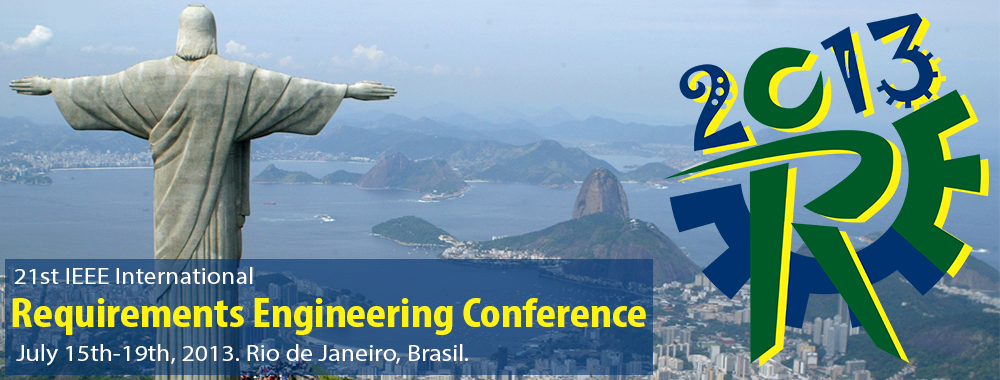News
- RE’13 presentation slides now available from the Downloads page.
Key Dates in 2013
- July 15: Doctoral Symposium
- July 15-16: Workshops & Tutorials
- July 17-19: Main Conference
RE@21: Sessions Dedicated to RE’s History AND Future @ RE’13
RE’13 is the 21st Requirements Engineering Conference. To mark this auspicious occasion, the theme of the conference is “RE@21: Keeping Requirements on Track”.
To keep both our work and our conference on track, we wanted to encourage the RE community to take stock; to look back to its past achievements (and failings) over the course of the past 20 years, to recognize the pressing challenges right now, and to set a path for the future. A few authors were up to the task, and we gather those papers that were accepted together in a special RE@21 session. The theme was also a cunning plan to push for a personal pet topic of traceability in the paper submissions. It probably worked – if you look at the main program, 16 of our papers are tagged with the “Requirements Management and Traceability” icon. Even better, one of these papers managed to addressed both of the aims at the same time: an RE@21 paper that reflects on traceability’s past at RE and its future
We also celebrate the RE@21 theme by doing something special. We invited all the prior winners of Most Influential Paper Awards from the RE conference series to come and tell the community about their award winning work. Normally, the award recipients just receive a certificate, and we never stop to examine this influence. However, for RE’13 we look back and we look forward with respect to some of our seminal work, at its trajectory and its impact. Six of our 11 years of MIP papers will be discussed in 2 unique sessions.
While the above RE@21 sessions focus on the discipline of requirements engineering, the work we have done and the work that remains, our final RE@21 session focuses on the forum through which we meet to explore the problems to work on and present the solutions we have crafted. If you care about the future of the RE community and its RE conference, come and help shape it.
1) RE@21 Papers (Wednesday @ 11am)
| Chair: | Bashar Nuseibeh (The Open University, UK, & Lero, Ireland) Co-author of “Requirements Engineering: A Roadmap” (2000) |
| Presenters: | Nancy Mead (Software Engineering Institute, USA) Sunil Nair (Simula Research Laboratory, Norway) Stephen Morris (City University London, UK) Gunter Mussbacher (University of Ottawa, Canada) |





| |
| Papers: |
|
2) RE@21 Spotlight: RE’s Most Influential Papers (MIPs)
| Abstract: | “Since 2003, an award has been presented annually at the IEEE International Requirements Engineering Conference for the Most Influential Paper presented at the conference 10 years previously. In 2013, we celebrate 21 years of the Require-ments Engineering Conference, and we use this as an opportunity to reflect on the Most Influential Papers to date. Two sessions of the 2013 conference highlight the work of previous award winners and provide the authors with the opportunity to describe the trajectory of their work over the ten years that led to the award, and to discuss its impact since.” [From the RE’13 Proceedings] |
Part I (Wednesday @ 4:30pm)
| Chair: | Martin Glinz (University of Zurich, Switzerland) Former RE Conference Steering Committee Chair (2007-2009) |
| Presenters: | Robyn Lutz (Iowa State University, USA) Annie Antón (Georgia Tech, USA) Eric Yu (University of Toronto, Canada) |




| |
| MIP Papers: | |
| 1993-2003 | Analyzing Software Requirements Errors in Safety-Critical, Embedded Systems, by Robyn Lutz |
| 1996-2006 | Goal-Based Requirements Analysis, by Annie Antón |
| 1997-2007 | Towards Modelling and Reasoning Support for Early-Phase Requirements Engineering, by Eric Yu |
Part II (Thursday @ 11am)
| Chair: | Roel Wieringa (University of Twente, The Netherlands) Former RE Conference Steering Committee Chair (2004-2006) |
| Presenters: | Cornelius Ncube (University of Bournemouth, UK) Anthony Finkelstein (University College London, UK) Jane Huffman Hayes (University of Kentucky, USA) |




| |
| MIP Papers: | |
| 1998-2008 | Acquiring COTS Software Selection Requirements, by Neil Maiden and Cornelius Ncube |
| 1994-2004 | An Analysis of the Requirements Traceability Problem, by Orlena Gotel and Anthony Finkelstein |
| 2003-2013 | Improving Requirements Tracing via Information Retrieval, by Jane Huffman Hayes, Alex Dekhtyar, and James Osborne |
3) An RE@21 Panel to Figure Out Our Own Requirements -- Where Do We Go Next and How? (Friday @ 11am)
| Title: | Future Directions of the RE Conference and its Community |
| Moderator: | Neil Maiden (City University London, UK) Former RE Conference Steering Committee Chair (2010-2012) |
| Panelists: | Anthony Finkelstein (University College London, UK) Tony Gorschek (Blekinge Institute of Technology, Sweden) Martin Mahaux (University of Namur, Belgium) Alistair Mavin (Rolls Royce PLC, UK) RoelWieringa (University of Twente, The Netherlands) |






| |
| Abstract: | “It is becoming clear that, after 21 successful years of the IEEE International Requirements Engineering Conference and Symposium, more and more community members are expressing different views about what the preferred scope, aims and activities of the community. Who should be involved – academics, practitioners, or both, and what should the new aims of the requirements community be? Whilst there are currently many unanswered questions, one thing seems to be agreed by most – that the current status quo is increasingly unacceptable. … To debate the issues, we have carefully selected 4 panelists, and some of the panelists and their colleagues have produced short papers that outline their positions for the panel. … In case you are in any doubt, this panel will not be for the fainthearted. Not only do each of the positions challenge us to think about requirements engineering research and advanced practice in different ways, but the panel will be composed of 4 past and future conference program chairs, all of whom will not be shy about sharing their views with anyone who will listen.” [From the RE’13 Proceedings] |



